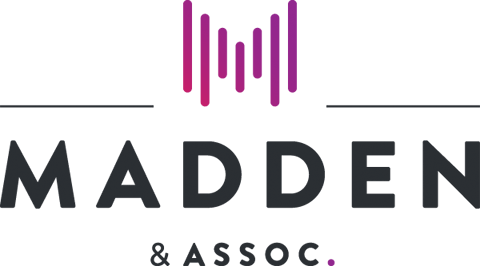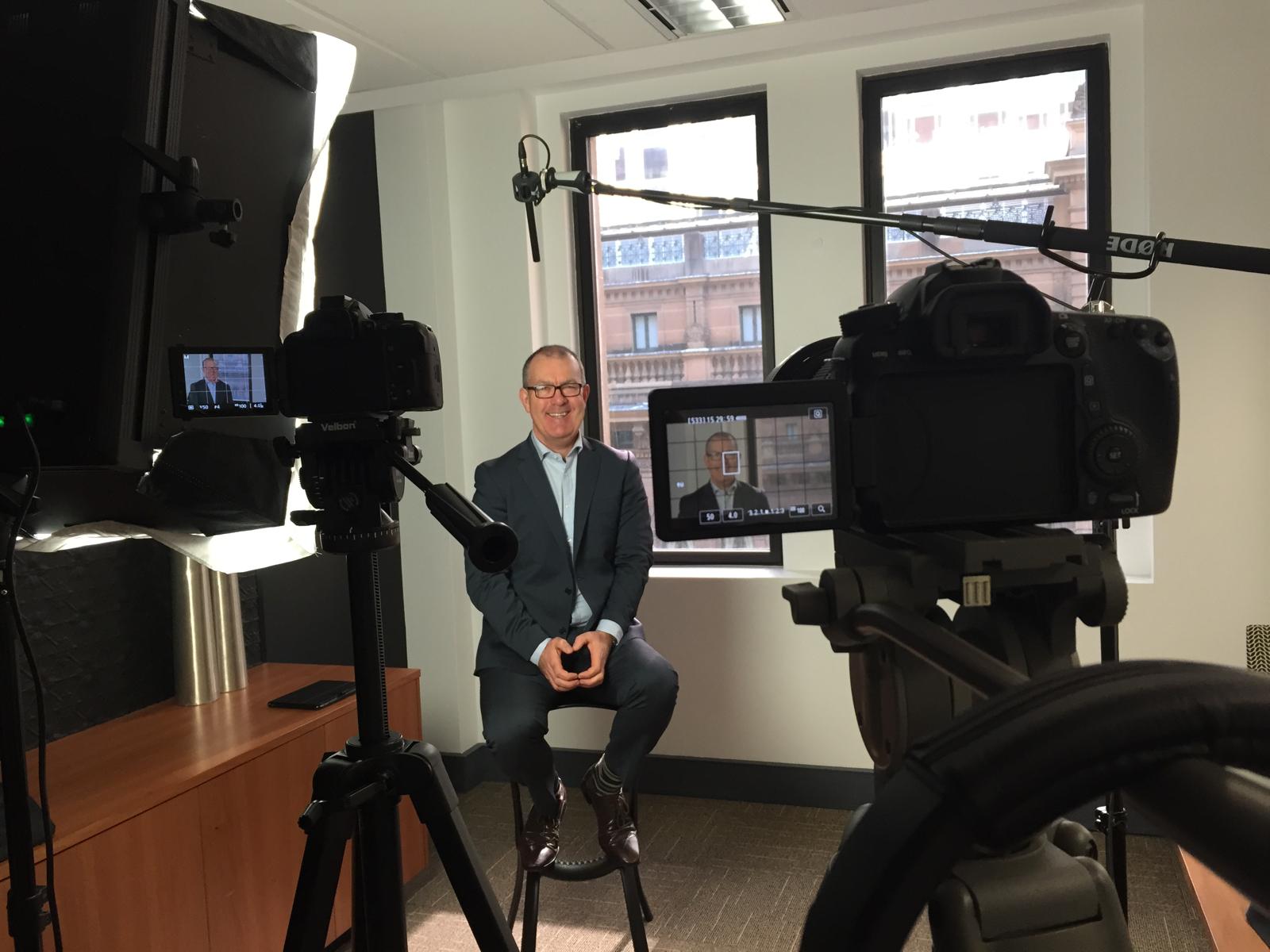Mastering the art of effective communication whilst projecting leadership attributes and confidence can feel like a daunting task for any executive. Add the pressure of doing that in front of a camera, bright lights, microphones and the glare of media accountability… and the fear factor can spiral off the charts.
But the media interview experience need not be unpleasant. In fact, many Madden clients have embraced their inner spokesperson and reached incredible heights in measure of reputation and bolstered career path, based on the foundations of a pragmatic and empathic program of message ideation and delivery, refined over decades by our firm.
To get some wisdom from the source, the Madden team recently enjoyed a regular ‘lunch and learn’ chat with agency founder, Bruce Madden, delving into a few insights and tapping his extensive network and experience gained over several decades, during which he has observed multiple media platform shifts, news cycles, issues and crises….and trained hundreds of executive clients from a broad cross section of corporate life here and abroad in the skills of sitting comfortably in the ‘hot seat’.
The Evolution of Media Training
How has media training and executive coaching evolved over the past few decades?
BM: Firstly, the term ‘media training’ is still today a broad-brush expression, as ambiguous in its use as the term ‘public relations’. It means many different things to different people. There was a time not that long ago when executive ‘media training’ was the blunt tool of shame. It relied on wheeling in hardened hack journalists to run high-pressure tactics, occasionally meeting executives in the car park for a ‘gotcha’ moment on camera and reducing those poor folk to a sodden puddle. Nothing about that experience stuck – the executive would be left with scar tissue: a memory of being shamed by the experience of being unprepared, fearful, and angry.
People would remember the pain rather than the positives. I’ve had executives reduced to tears in those ancient days, later suffering from PTSD-style panic attacks whenever the word ‘media’ was raised. Or they simply remember the ‘cockpit drills’ of how to sit in a chair, what not to wear, how to quiet their hand gestures, and whether or not make-up is a good idea for on-camera interviews.
Today, our approach emphasises authenticity and tailored learning, guided by a few proven principles including ‘less is more.’ Moving away from those ghastly hypothetical ‘scare’ methods, we focus on keeping things simple and positive in all media interactions. One important goal is to foster earned trust which is crucial in today’s media and digital media landscape.
“Media training has become a balance of mental toughness and compassion.“
While there is a need to prepare individuals for rigorous media scenarios, there is also a compassionate approach to support the human being through these challenges. Recognising that people typically experience a range of emotional reactions in high-pressure environments, our strategy combines rigorous preparation with a proportionate dose of empathy. This approach – of walking in the executive’s shoes for a moment – aims to empower leaders to navigate media interactions confidently and being authentic to their higher purpose, commercial goals and reputation. We also occasionally need to use the ‘stick’ method if the ‘carrot’ approach doesn’t yield the right outcomes.
The Future of Media Training
What trends do you foresee shaping this space over the next decade, especially considering the impact of digital media and AI?
BM: The emergence of deepfake AI raises critical questions about reputation, integrity and credibility. Emerging technologies will prompt a renewed focus on verifying information, fact-checking, and supporting public trust at the source. To me, this enhances the importance for individuals to cultivate and lock down a secure and authentic public persona in trusted formats to help counter potential misinformation.
In addition to combating deepfakes, preparedness, real-time engagement and crisis management practice will become essential as the pace of media and the media industry’s own audience algorithms accelerate. The ability to respond quickly and effectively in high-pressure situations will be a crucial skill for executives. As will the ability to quickly ‘news jack’ on topics that are trending with media audiences, offering deeper value to trusted media sources and their audience.
Media Training Misconceptions
What are the most common misconceptions about media training and executive coaching that you meet?
BM: Many executives come to our training sessions (Madden trained over 100 executives in the year to June 30, 2024, alone) believing they don’t require training. “I’ve got all the necessary details down pat….” In other words, they are very focused on the ‘what’ of media training…what it is, what importance it has for their job, KPI, reputation etc.
But actually, they are often not at their personal best and getting lost in the detail of the doing. And they are yet to consider their ‘why?’ Why this media engagement is an opportunity to demonstrate a higher purpose, align my passion, lead my people.
Our job is to help the client focus on the essentials by essentially asking: What are we conveying here? and what are we giving as proof that supports and shows (not tells) your perspective?
“By understanding the ‘game’ of media, individuals can engage better with media.”
A lot of people just say, ‘why bother with media?’ Or they come into media training with preconceived notions that the media is only interested in negative stories, click bait, the hatchet job. However, once we stretch the boundaries of their understanding of ‘the game’ they begin to enjoy the training experience and engage more deeply with the process. This understanding, backed with a few proprietary “Maddenisms” helps them embrace the experience and become better communicators, and be media ready. Interestingly, those who come into media training the most sceptical often gain the most value from the training (and don’t want to leave at the end of our sessions).
Valuable Lessons in Media Training
Reflecting on your experience, what lessons or principles have consistently proven valuable in helping executives excel in media interactions and communication strategies?
BM: Narratives and storytelling are incredibly important and can’t be underestimated. An audience will assess credibility automatically on the power of a story to connect and resolve their in-built scepticism or barriers. Hollywood calls it suspension of disbelief! Strong narratives not only help executives connect with their audience, the right message or messages, lead to measurable action.
Finally, applying false pressure during crisis scenario training is another critical lesson. It’s essential to know in training and mock interviews what impact certain scenarios have and to build ‘muscle memory’ for the real stuff. You never know when an organisational issue can suddenly flare into a full-blown crisis.
“Keeping it simple is always a valuable takeaway.”
This doesn’t mean memorising and reciting information by rote (nobody wants to see an interview with an automaton or your avatar) but keeping a clear and consistent narrative backed by proof.
Building Confidence in Media Interactions
What advice do you offer to executives who feel apprehensive about public speaking, media, or podcast interviews, and how do you help them in building confidence in their communication abilities?
BM: What’s key is ensuring you are focused first on message ideation and communication delivery. We’ve seen really great success in applying our core principles in some surprising ways. Like property and investment sales teams doing highly technical, high risk client pitches or presentations to meet sales targets, proving that effective communication strategies are universally beneficial.
Our media training has consistently resulted in effective deployment of skills where executives face difficult conversations when facing the media.
“It’s about personal confidence.”
Part of the magic if you like is to focus on building confidence first through message ideation and delivery training, ensuring executives are educated, empowered with a why, then prepared and self-assured in their media interactions.
Ready to enhance your media training? The EOFY is a great time to get your media and message training delivery in order. Reach out to our Sales and Marketing Director Penne at penne@madden.com.au to set up a chat with team Madden.

